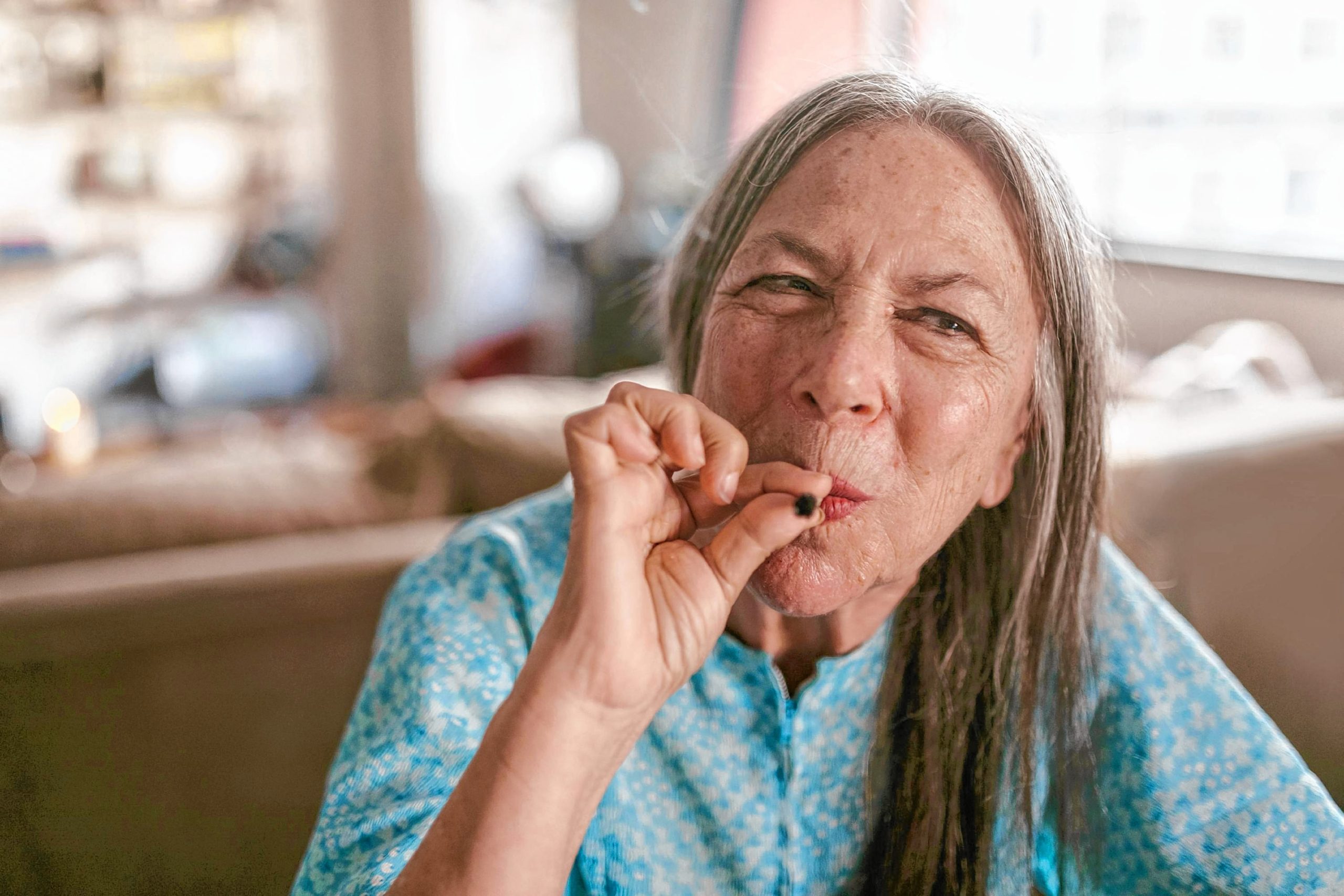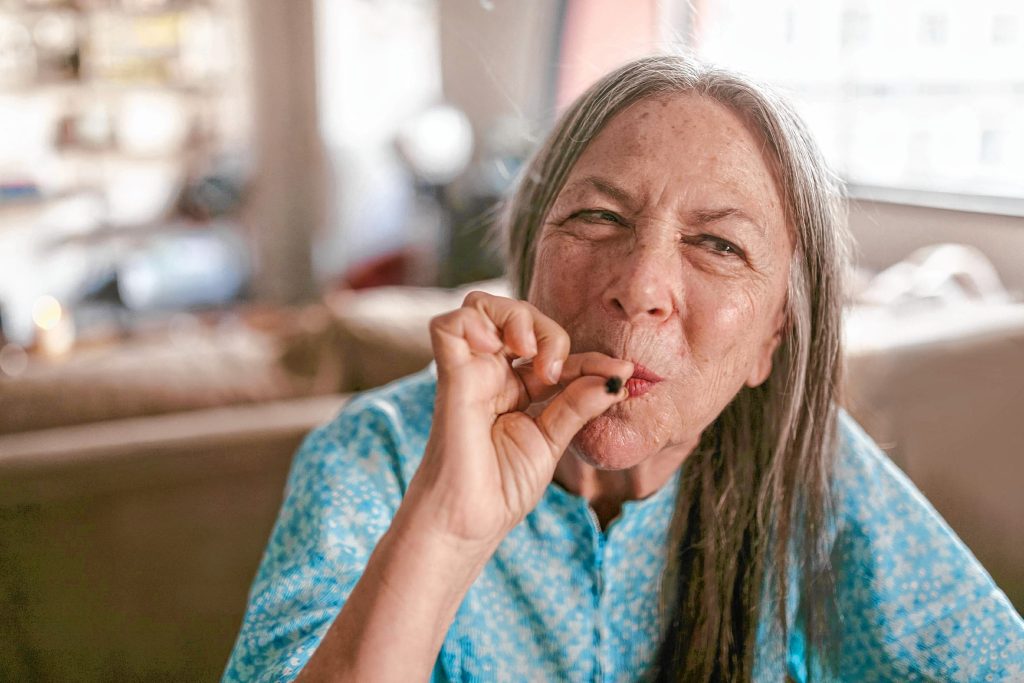By Robin Goldstein
For the Valley Advocate
As an economist studying the weed industry, I end up in a lot of policy discussions with people who do not believe that weed should be legal. Their points are often fair, well reasoned, thought-provoking, and deserve to be heard and carefully considered.
In this column, I conjure up an imaginary weed prohibitionist — the most thoughtful and reasonable kind — and offer my responses to a few of their toughest questions.

PEXELS
There ia some anecdotal evidence suggesting that there has been some growth in weed sales to older Americans (especially 55–64 and 65+). These are people who are typically less familiar with the product, less likely to buy from illegal dealers, and more likely to appreciate the safety testing, state certification, and convenient, user-friendly budtender experience that you get at a legal dispensary.
Prohibitionist: We all know weed can be harmful, especially to heavy smokers. If we legalize weed and sell it openly at stores, then more people of all ages will get high. We’ll have more kids frying their brains, more drug addicts on the streets. How could you support such a policy?
Robin: Although it might seem obvious that people will smoke more weed if it’s legalized, there’s no credible scientific evidence, to date, for a connection between legalization in a region and the amount of weed consumed by its residents. Even after the Netherlands became the first country to decriminalize weed in the modern era, in the 1970s, Dutch weed consumption didn’t appear to increase. That’s not to say that there couldn’t be any connection between legalization and increased use — just that no U.S. or foreign data to date have ever shown one.
Prohibitionist: The idea that there could be no connection is highly counter-intuitive. How could it possibly be true?
Robin: First, consider that the vast majority of weed is consumed by regular (or “heavy,” in drug-policy lingo) users. Now consider the experience of the typical weed consumer. Even where weed is completely illegal, regular users know exactly how to get good weed from a trusted underground source at a good price. This is true not only for flower, but also for vapes and gummies. Generally this illegal weed can be delivered 24/7 (unlike legal weed). And often its quality is as high or higher than legal weed.
The introduction of an additional option to buy licensed weed (almost always at a significantly higher price) may or may not convince people to switch their business from their trusted underground source to a licensed store. Some will, others won’t. Either way, regular weed users are already smoking as much weed as they want, there’s no obvious reason that legalization would change how much weed they consume.
Prohibitionist: You say there’s no “obvious reason,” but how can you be sure that legalization doesn’t increase weed use?
Robin: I’m not sure at all. On the contrary, in some places, legalization might well increase use. Just because the effect has never been observed doesn’t mean it couldn’t exist.
Underlying the lack of empirical evidence is a data gap: total weed use is almost impossible to measure. For most products, the amount used is approximated by the amount sold, which is measurable. If you want to know how much liquor has been drunk in Massachusetts, you can get a pretty good estimate by looking at liquor tax collections.
Weed regulators, like alcohol regulators, can track how much weed is sold in licensed stores that report their sales and pay their taxes, but nobody has any way to track unlicensed sales. Total weed sales includes both licensed and unlicensed sales, so there’s no way to measure the total weed sold — and thus, by implication, consumed — in a state like Massachusetts. All you can really do is take a wild guess.
In the U.S. academic literature, the wild guesses, most of which show up in health or drug journal articles, almost all share the same fundamental problem: they rely on U.S. government health surveys, where government-appointed surveyors randomly call U.S. households and ask people how much weed they’ve smoked in the last month.
Picture this: a federal government interviewer calls you on the phone and asks you if you smoke weed. What do you say?
Astonishingly, more than 10% of Americans say yes, thus admitting to the government that they have committed a federal crime. Some people are just oddly honest. Or maybe they were high.
Much less astonishingly, a lot more people tend to admit to smoking weed in states that have legalized weed versus states where it’s illegal. So when a state passes legalization, the percent of its users who will openly admit to the government that they consume it will go up.
This trend has been widely misused, especially by mass media, as evidence that legalization causes an increase in weed smoking. In reality, all we know from the government surveys is that legalization increases the number of people who admit to the government that they smoke weed.
We also know that an unprecedented wave of public weed tolerance has swept over America in the past two decades. The stigma associated with weed has decreased dramatically. From 2012 to 2022, the percent of Americans supporting weed legalization in Gallup polls went from a minority (48%) to a two-thirds majority (68%).
The wave of tolerance has come across the board, in red states and blue states, states that have legalized and states that haven’t. Legalization, where it has happened, seems to be the political effect of this wave of acceptance, not the cause.
Prohibitionist: Even if that’s all true, surely there must be some people who start smoking weed just because it’s legal, right? My faithfully law-abiding Grandma, for instance — there’s no way she would ever have bought drugs on the street. She won’t even tear the label off her mattress. She believes in the rule of law, and she believes in following it. Aren’t there other people like her out there, who legalization will bring into the market?
Robin: Yes, that’s fair. There are Americans who faithfully follow the law. There may not be a big overlap between them and people who want to try weed for the first time, but there is some anecdotal evidence (from marketing and industry data, not self-reported use surveys) suggesting that there has been some growth in weed sales to older Americans (especially 55–64 and 65+). These are people who are typically less familiar with the product, less likely to buy from illegal dealers, and more likely to appreciate the safety testing, state certification, and convenient, user-friendly budtender experience that you get at a legal dispensary.
On the other hand, Grandma taking gummies for her back pain is not one of the big societal dangers people tend to worry about with legalization. In policy circles, it’s generally agreed that the goal is minimizing the harm resulting from a drug, not minimizing the mere use of a drug.
Prohibitionist: So you’re saying that weed is harmless?
Robin: Not at all. Weed can be highly addictive — not as much as tobacco or alcohol, but don’t believe anyone who tells you it’s not addictive at all. When overused, weed can cause all sorts of mental and physical harms — including, in its smokable form, lung cancer. Especially among kids and other inexperienced users, it can also cause paranoid freak-outs that land people in hospitals and clog emergency-room beds.
But the harm-reduction approach is to evaluate the magnitude of harms associated with weed addiction and abuse, and compare them with the magnitude of harms associated with prohibition (like mass incarceration). If weed consumption goes up by 5% after legalization, and a lot of that is Grandmas, then the total harms caused by additional addiction and abuse are likely minor, and given the countervailing societal effects of releasing effective medicine into the market, the overall effect on social welfare may be positive.
It is also important to keep in mind that unlike alcohol and thousands of legal pharmaceutical products, weed has never directly caused a single overdose death.
Meanwhile, almost nobody is suggesting legalizing weed for kids. They can’t buy at legal stores with or without prohibition, so their access isn’t affected by legalization.
Prohibitionist: What would you do, in that case, that would actually reduce harm from weed — what’s your solution to the problems you identify?
Robin: Legalization — but the right kind of legalization. I mean the kind that actually achieves its goal of shifting most of the business from the illegal market to the legal market, and replaces the illegal weed supply with a legal one.
First, this means that legal weed needs to be cheap — just as cheap, or almost as cheap, as illegal weed of the same quality. This means avoiding costly regulations and high cannabis taxes that drive up the price of legal weed compared to illegal weed, and keep business in the hands of unlicensed sellers.
To achieve this, regulations need to be cheaper and easier to comply with and more narrowly focused on public health and safety. Most harms caused by weed come from people not knowing what they’re consuming. Weed is safest when it’s tested for poisonous toxins (e.g. residual solvents in vapes), sold in child-proof packaging, and accurately labeled with a clearly visible THC warning label and (albeit imperfect) potency measurements.
Until then, as long as regulations and taxes remain unusually costly, the legal weed market will remain small, and unlicensed, unlabeled weed will continue to proliferate, putting our kids — and everyone else — in harm’s way.
Prohibitionist: Even if your policy proposals were effective, there’s still something that just bothers me about having all these legal weed stores around. What message is our government sending by legalizing?
No matter how much data you show me, I’m just not convinced that making something officially legal wouldn’t have the effect of normalizing it in people’s minds — sending the message to a generation of impressionable kids that it’s okay to smoke weed. To me, laws are not just sets of rules, but also expressions of the values that we collectively embrace as a community and raise our children with.
Robin: I agree completely about this role of laws in our society. My beloved law professor Bill Eskridge liked to call this the “expressive power” of the law.
There’s just one little problem: more than two in three Americans support legalizing weed.
So what value would it be most fair for our laws to express?
Prohibitionist: Yeah. I’m moving to Singapore.
Robin Goldstein is a research economist and director of the Cannabis Economics Group at the University of California, Davis. He is also a 1% shareholder of Cambium Analytica, a cannabis testing lab.



